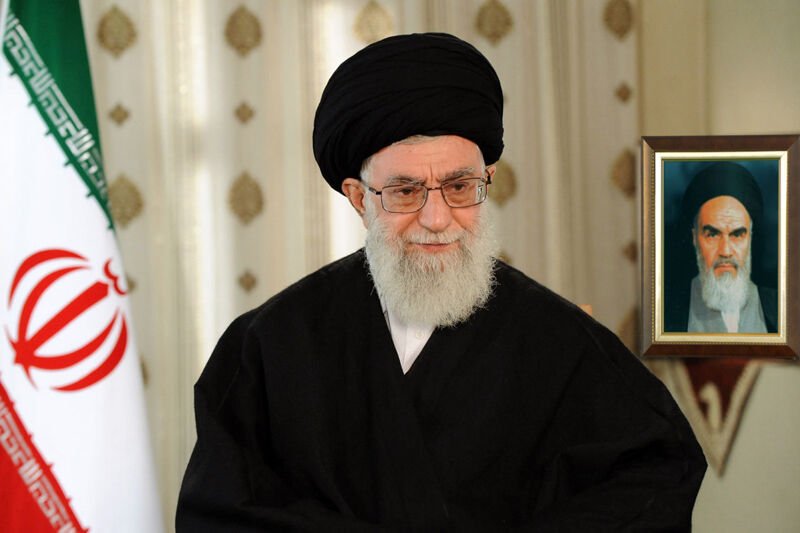To achieve peace, Iran needs True Promise IV
The time for strategic ambiguity is over. Tehran must act decisively to preempt another, more consequential war engineered by Tel Aviv and rubber-stamped by Washington.
Shivan Mahendrarajah
SEP 24, 2025

Photo Credit: The Cradle
On 21 June at the height of the 12-day war between Israel and Iran, Steve Bannon – US President Donald Trump’s former White House strategist and a well-connected Washington insider – declared on his War Room show, “The party is on. Another big weekend in this unfolding aspect of WW3.”
A day later, Trump ordered airstrikes on the Islamic Republic of Iran. On 16 September, referring to Senator Marco Rubio’s trip to Israel, Bannon said, “My sources are impeccable, they’re still pushing regime change in Iran. Don’t think you [the anti-war Republican audience] are out of this one by a long shot.”
When Bannon, who has emerged “as one of the loudest critics of US support for Israel's military campaign,” sounds the alarm, Tehran should take notice.
The roadmap to war
The snapback of UN sanctions, initiated last month, which will see them reimposed on 27 September, essentially is a prelude to war. Tehran has already announced that it will suspend cooperation with the International Atomic Energy Agency (IAEA) in response – but this alone may not be enough.
As Iranian MP Ahmad Naderi rightly stated:
“Acquiring nuclear weapons is the only way to preserve Iran’s territorial integrity and national security. Withdrawing from the NPT [Nuclear Non-Proliferation Treaty], adopting a policy of ambiguity, and ultimately testing the atomic bomb is the only option that can spare Iran the fate of Iraq and Libya.”
Naderi’s sentiments are echoed by Iranians from every socio-economic stratum and political leaning. The views of many (or most) Iranians have matured since Israel’s sneak attack during negotiations with the US.
Iranians know that over the 10-year life of the Joint Comprehensive Plan of Action (JCPOA), they have received no benefits. They recognize that Israel and the US seek not just regime change, but the partition of Iran along ethno-linguistic lines.
The Iranian “man on the street” gets it, yet Iran’s decision-makers appear paralyzed. An Iranian military analyst wrote on 19 September, regarding withdrawal from the Nuclear Non-Proliferation Treaty (NPT), “The reality is the top leadership doesn’t want to go through with it … we know talks are useless but seems the leadership hasn’t realized that or is lying to itself about it.”
The reformist illusion of diplomacy
For a decade, Iran’s so-called Reformist diplomats have embarrassed the nation. Their negotiating strategy has delivered no concessions from the west, only humiliation.
While Iranians pride themselves on diplomatic cunning, the sixth-century Strategikon – attributed to Emperor Maurice of Byzantium – described the Persians as “intractable in negotiations,” noting they would not initiate proposals even when those proposals served their own interest – the JCPOA process has been a study in failure.
On 17 September, Saeed Jalili, a former nuclear negotiator and member of the Supreme National Security Council (SNSC), wrote on X about how, during the Qajar era, Britain and Iran penned a treaty in which Iran’s obligations were “very precise and scheduled,” while British promises remained vague. “The same pattern,” he warned, “is repeated again in JCPOA.”
Ali Larijani, a former speaker of Iran’s parliament, currently the secretary for the SNSC, stated on X on 21 June, “When the war ends, we will settle the score with [IAEA Director Rafael] Grossi.”
By 9 September, Abbas Araghchi, Iran’s foreign minister and former nuclear negotiator, was in Cairo offering illegal concessions to Grossi. Far from appeasing the E3 states, this groveling only hardened their position. French President Emmanuel Macron even declared on Israeli television that the snapback was “a done deal.”
Even Iran’s attempt to introduce a resolution at the IAEA barring strikes on nuclear facilities was withdrawn to show “goodwill.” The west responded with snapback sanctions. After the vote, Iran’s UN envoy Amir-Saeed Iravani appeared visibly shaken and announced, “the door for diplomacy is not closed …”
This pattern of diplomatic capitulation has run its course. Over the past decade, every Iranian concession has been met not with compromise but with increased pressure. What Reformists call engagement now functions as an invitation to escalation.
Strategic unpredictability begins with IAEA exit
Western diplomats are betting that Iran will not leave the NPT. Their bet is well placed – so far. Iran’s foreign policy is predictable, bloated with bombastic warnings and empty ultimatums.
To reverse this failed approach of strategic ambiguity, Tehran must embrace strategic unpredictability. As the Chinese master strategist Sun Tzu taught, “divinely mysterious ... he is inaudible. Thus he is the master of his enemy’s fate.” Reflexive control, not reactive diplomacy, must define this moment.
The exit process begins with a written notification to the UN Security Council, triggering a 90-day waiting period. When North Korea began this process in 1993, negotiations briefly interrupted the withdrawal – but in 2003, Pyongyang followed through. Iran must do the same.
No more talks. No more “diplomatic initiatives.” Israeli Prime Minister Benjamin Netanyahu has hijacked US policy, replacing Steve Witkoff with Marco Rubio. Washington must be told, “call the Islamic Revolutionary Guard Corps (IRGC). They hold the file now.”
Snapback must be met with blowback
The E3 states triggered snapback sanctions because they expect no consequences. They violated JCPOA terms, enforced US secondary sanctions, and cheered Israeli aggression – all without penalty. German Chancellor Friedrich Merz even gloated that Tel Aviv is doing “the dirty work for us.”
Iran must change the rules of the game. Disrupting European energy flows is the logical next step. In 2023, Germany imported 1.5 million barrels per day (bpd) of oil from West Asia, France imported 900,000, and the UK imported another 900,000. These fragile economies, already strained by sanctions on Russia, cannot absorb further shocks.
Their leaders are deeply unpopular. Merz enjoys 25 percent approval; Macron only 17; and Keir Starmer’s net rating is –44. Tipping these states into recession may be the surest path to regime change – this time in Europe.
Iran's IRGC understands pressure. The late, martyred Quds Force general, Qassem Soleimani, also understood this. The 2019 strikes on oil tankers and ARAMCO, claimed by Yemen’s Ansarallah-allied armed forces, but attributed to the IRGC, laid the groundwork. Escalating now – before war fully ignites – prepares the terrain for a fourth installment of Operation True Promise. As global markets reel from energy shocks, the pressure on the US and UN to rein in Israel will mount.
Preparing for True Promise IV
“Do not make light of any enemy, no matter how unworthy he may be.”
– Shahnameh, by Ferdowsi
War is inevitable. Israel wants war with Iran; Israel will get war with Iran.
The “top leadership” fails or refuses to accept that US/E3 policies are determined in Tel Aviv. War was always the objective. After 9/11, then-Israeli prime minister Ariel Sharon initiated the Iraq War. Iran was supposed to be next.
Iran’s nuclear program is merely an excuse to sanction and weaken the Islamic Republic before war. Netanyahu insists on unreasonable demands – zero enrichment, dismantling of Iran’s nuclear program, missiles – because he knows these demands will be rejected. War is Israel’s path to destroying and partitioning Iran, leaving no regional power to oppose its “Greater Israel” ambitions.
Only Netanyahu's latest war misfired. The Israeli military led the charge, relegating NATO allies to logistical roles. As Bannon admitted, “[the] ceasefire was as much to save Israel ... They bit off way more than they could chew.”
Next time, Tel Aviv will push Washington to lead. Trump’s public “anti-war” stance is meaningless. He is compromised – by the Epstein files and by his own court of Zionist advisors. Charlie Kirk’s assassination sent a chilling message to dissenters.
The US military apparatus is no safeguard. It is riddled with loyalists, not strategists. Intelligence is bypassed; policy is written in Tel Aviv and whispered into Trump’s ear by Mossad operatives embedded in his inner circle.
Tulsi Gabbard (DNI) has proven malleable; “Whiskey Pete” Hegseth is an Evangelical, Islamophobe, and incompetent; and Rubio is solidly behind Netanyahu.
Channels of communication to POTUS on national security matters are bypassed by Israel. CIA Director John Ratcliffe is the “‘Mossad stenographer’ on Iran”; White House Chief of Staff Susie Wiles, who worked for Netanyahu, is isolating Trump to feed him talking points and manipulate him into bombing Iran.
The journalist who broke this asks, “What’s going on here? That’s what we’re unmasking. The biggest foreign influence infiltration operation in American history that is basically taking control of an administration.”
Peace through superior firepower
Iran’s leadership now faces a defining choice. Netanyahu does not fear a nuclear strike as he knows Tehran will not launch first. What he does fear is Mutually Assured Destruction (MAD). That is why Tel Aviv demands zero enrichment and the dismantling of Iran’s missile program.
Without a nuclear arsenal, Iran faces existential risk. If Tel Aviv strikes first – as it almost certainly will – Iran will be forced onto the defensive. Surprise, as Carl von Clausewitz reminds us, “multiplies the effect of the force employed.”
Contrary to the fanciful hopes of Reformists, there will be no sanctions relief through diplomacy. Tel Aviv will sabotage every deal. The only path to permanent relief is victory. Iran’s armed forces have already forced Netanyahu to beg for a ceasefire. The next phase must end with him begging for a treaty.
https://thecradle.co/articles/exit-or-b ... e-iaea-now
Iran rebuilding missile-production sites struck by Israel: Report
The reconstruction efforts are allegedly hindered by missing equipment essential for missile production
News Desk
SEP 24, 2025

(Photo credit: AP)
Iran has begun reconstructing missile-production facilities damaged during its 12-day war with Israel in June, though analysts caution that the planetary mixers – key components for the production of solid fuel – remain absent, AP reported on 24 September.
New satellite imagery reviewed by AP shows work underway at both Parchin and Shahroud. Sam Lair, a research associate at the James Martin Center for Nonproliferation Studies, said mixing halls at Parchin appear to be under repair, with parallel efforts at Shahroud.
“If they’re able to reacquire some key things like planetary mixers, then that infrastructure is still there and ready to get rolling again,” he noted.
Planetary mixers, designed with blades revolving around a central hub like orbiting planets, are essential for evenly blending propellant.
Experts believe Israeli strikes in June deliberately hit the buildings housing the mixers, along with facilities that could manufacture them, in an effort to cripple Iran’s missile production.
Tehran has offered no public comment on its reconstruction drive.
Iran’s mission to the UN declined to answer questions, while Defense Minister Aziz Nasirzadeh stated, “We are now focused on producing military equipment with higher precision and greater operational capabilities.”
The pace of rebuilding highlights the weight the Islamic Republic places on its missile arsenal – Iran’s main military deterrence in the absence of nuclear weapons.
Unlike its bombed nuclear sites, which remain inactive, Parchin and Shahroud are being actively restored.
Carl Parkin, a summer fellow at the James Martin Center, said Iran had been on track to produce over 200 solid-fuel missiles monthly before the war, a capability that drew Israeli attention.
According to the Washington-based Jewish Institute for National Security of America, Iran launched 574 ballistic missiles during the June war.
Another 330 were fired in two earlier exchanges, meaning more than a third of its estimated 2,500-strong arsenal was expended.
Analysts describe the absence of mixers as a critical limitation, with Parkin saying Israel’s strikes suggest it judged mixing to be Iran’s main production bottleneck, making them a high-priority, high-impact target.
“If Iran is able to overcome their mixing limitations, they’ll have all the casting capacity that they need to start producing at high volumes again,” he explained.
https://thecradle.co/articles/iran-rebu ... ael-report
*****
How MI6 Fabricated Iran Nuke Fraud
Posted by Internationalist 360° on September 24, 2025
Kit Klarenberg
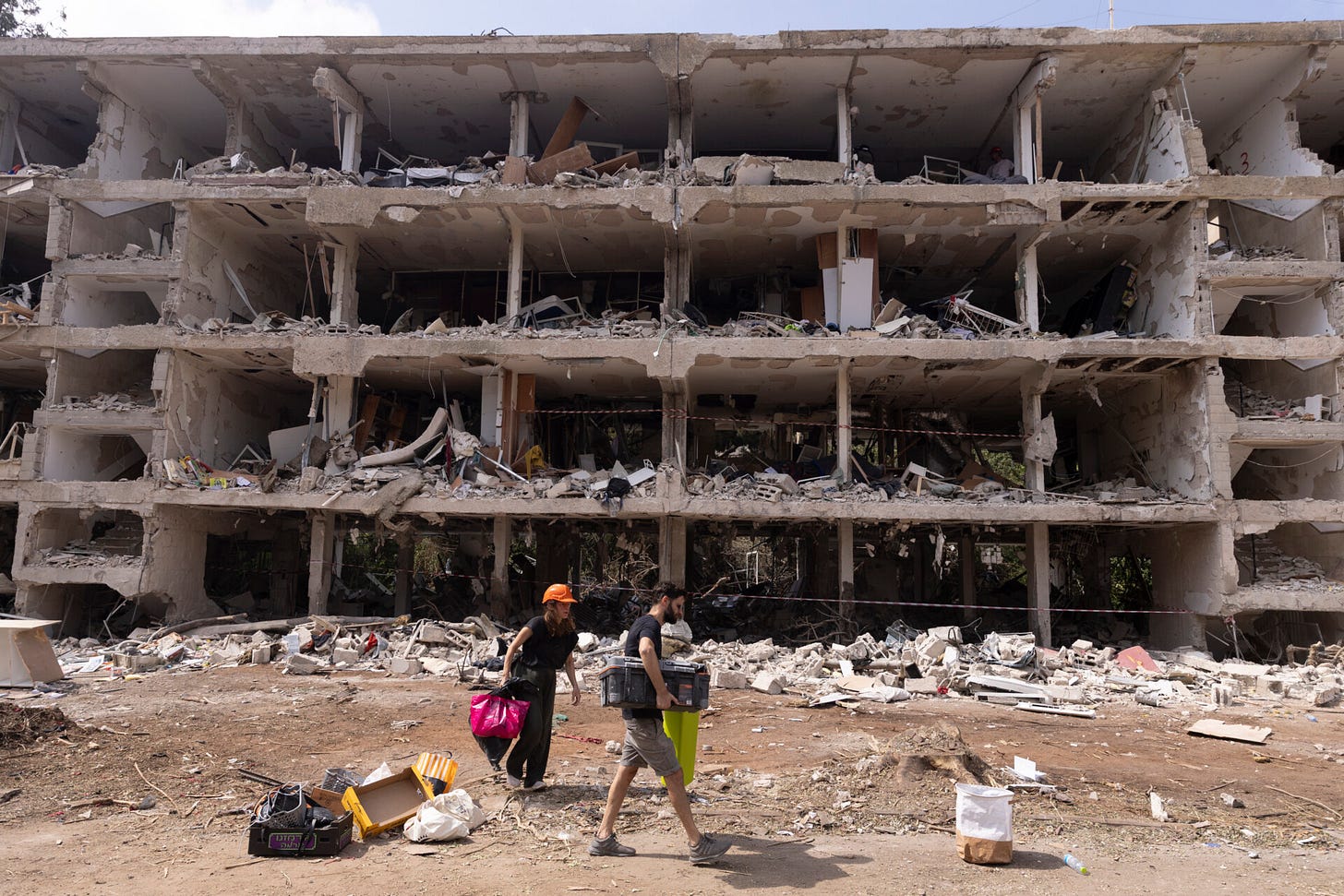
The aftermath of an Iranian ballistic missile strike on Tel Aviv, June 2025
On September 19th, the UN Security Council voted to reimpose savage economic restrictions on Iran over its nuclear program. European leaders have in recent months repeatedly accused Tehran of refusing to abide by the 2015 Joint Comprehensive Plan of Action’s terms. A core, repeated claim is the Islamic Republic has collated a uranium stock over 40 times the level permitted under that deal. No supporting evidence for the charge has been provided, and the source of this information isn’t clear.
It may nonetheless be highly significant London has taken the lead in calling for the restoration of sanctions, independently imposed punitive measures on Iranian individuals and commercial entities, and employed relentlessly bellicose rhetoric about the Islamic Republic’s purported breaches of its JCPOA commitments. In August, then-Foreign Secretary David Lammy declared Tehran had “consistently failed to provide credible assurances on the nature of its nuclear programme.” In the wake of the UNSC vote, British ambassador Barbara Woodward proclaimed, “we urge [Iran] to act now.”
As this journalist has previously exposed, the JCPOA resulted from a long-running MI6 black propaganda campaign to falsely frame the Islamic Republic as possessing nuclear weapon ambitions, if not nukes outright. Under the Agreement’s terms, Tehran received sanctions relief in return for granting the International Atomic Energy Agency virtually unhindered access to its secret nuclear complexes. Despite the IAEA consistently certifying Iran’s compliance, the Trump administration shredded the Agreement in May 2018, and launched a “maximum pressure” campaign to cripple the country.
Information gathered by the IAEA under the Agreement appears to have assisted Israel’s criminal 12 Day War in June, raising the obvious question of whether the Agreement was always intended as an espionage operation, in preparation for future conflict with Tehran. This interpretation is amply reinforced by leaked documents, indicating the IAEA provided Zionist entity intelligence with names of Iranian nuclear scientists who were subsequently assassinated. Meanwhile, the papers show Agency chief Rafael Grossi enjoys an intimate, covert relationship with officials in Tel Aviv.
These disclosures understandably motivated Iranian lawmakers and President Masoud Pezeshkian to halt any and all cooperation with the Agency. The sanctions eased by the JCPOA being the product of an MI6 black propaganda effort, to falsely convince the West and its overseas proxies and puppets Tehran posed a global nuclear weapon threat, provides the Republic with even more urgent justification for ignoring the Agreement’s terms. Iran’s grounds for rejecting any accommodation with the same countries now seeking to sanction her are inarguable.
‘Supportive Relations’
At the centre of MI6’s black propaganda war on Iran was longtime British intelligence officer Nicholas Langman, a veteran dark arts specialist who has been repeatedly publicly exposed perpetrating the dirtiest imaginable deeds for London’s foreign spying agency the world over. He was for example intimately implicated in Britain’s contribution to the CIA’s global post-9/11 torture program. However, rather than being penalised or defenestrated for his actions and unmasking, he appears to have been richly rewarded, and consistently failed upwards.
A leaked CV shows 2006 – 2008, Langman led MI6’s Iran Department. Here, he oversaw a team seeking to “develop understanding” of Iran’s “nuclear program”. Then, 2010 – 2012, he led an “inter-agency” effort to infiltrate the IAEA, while “[building] highly effective and mutually supportive relations across government and with senior US, European, Middle and Far Eastern colleagues for strategy which enabled major diplomatic success [sic] of Iranian nuclear and sanctions agreement.”
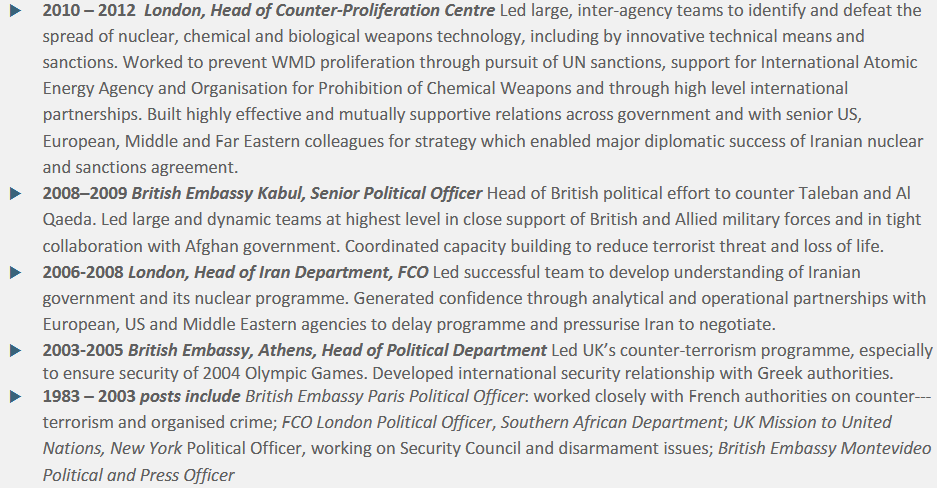
Nicholas Langman’s leaked CV
It was during the latter period that public and governmental attitudes across the West – and in vassal states – towards the Islamic Republic became highly belligerent, and negative. One by one, governments and international bodies – including the EU and UN – imposed ravaging sanctions against Tehran, devastating its economy, influence, and standing. MI6 journeyman Langman triumphed in his mission to foment concerted global hostility against Iran, based on the bogus spectre of the country posing a nuclear threat.
The question of whether British ‘intelligence’ on Iran’s nuclear program was the product of torture is an open and obvious one. Langman moved straight to leading MI6’s Iran Department from running the agency’s station in Athens, Greece. There, in late 2005, he was exposed by local media as having overseen an operation to abduct and ferociously mistreat 28 Pakistani guestworkers, wrongfully suspected of having had contact with individuals accused of perpetrating the 7/7 bombings in London in July that year.
That Langman wasn’t reprimanded over the incident strongly suggests he enjoyed a high level of protection, and London approved of his vicious intelligence-gathering methods – known to invariably produce false testimony from detainees. MI6 was not only an enthusiastic collaborator in the CIA’s global extraordinary rendition program, but led its own operations. Markedly, in at least one case, the British sought to sideline the CIA and ensure exclusive access to “intelligence” from a detainee in which Langley also had an interest.
The Obama administration was during its first year in office formally committed to non-interference in the Islamic Republic’s affairs, to the extent State Department apparatchik Jared Cohen was almost fired for publicly demanding Twitter halt planned maintenance during June 2009 protests in Iran, to ensure demonstrators could continue posting. It’s therefore unknown whether Washington was in on MI6’s Iran nuke con. If not, it wouldn’t be the first time British intelligence has misled the international community, with catastrophic results.
‘Possible Manipulation’
In July 2004, the Senate Intelligence Committee issued a scathing report on “the US intelligence community’s prewar intelligence assessments on Iraq.” It reserved particular disdain for how the CIA et al had “[relied] too heavily on foreign government services and third party reporting, thereby increasing the potential for manipulation of U.S. policy by foreign interests [emphasis added].” This was a reference to MI6’s central role in gathering – or concocting – intelligence on Baghdad’s purported WMD capabilities:
“Due to the lack of unilateral sources on Iraq’s links to terrorist groups like al-Qaida [redacted], the [US] Intelligence Community (IC) relied too heavily on foreign government service reporting and sources to whom it did not have direct access to determine the relationship between Iraq and [redacted] terrorist groups…The IC left itself open to possible manipulation by foreign governments and other parties interested in influencing US policy.”
As far back as the late 1990s, Britain’s foreign spying agency took the lead on sourcing dud ‘intelligence’ to manufacture consent for the against Baghdad. Under the auspices of a psychological warfare effort dubbed Operation Mass Appeal, MI6 black propaganda specialists circulated false information to foreign editors and reporters on its payroll “to help shape public opinion about Iraq and the threat posed by WMD,” which was then recycled by Western leaders and news outlets to reinforce its credibility.
In September 2002, then-MI6 chief Richard Dearlove personally approached British Prime Minister Tony Blair, claiming his agency had cultivated a source inside Iraq with “phenomenal access”, who could provide the “key to unlock” Iraq’s purported WMD program. Their assorted claims subsequently formed the basis of a dossier, which made a number of wild charges about Baghdad’s chemical and biological weapon capabilities. A prominently reported allegation was that Iraq could deploy WMD against Western countries within just 45 minutes. Its source was an Iraqi taxi driver.
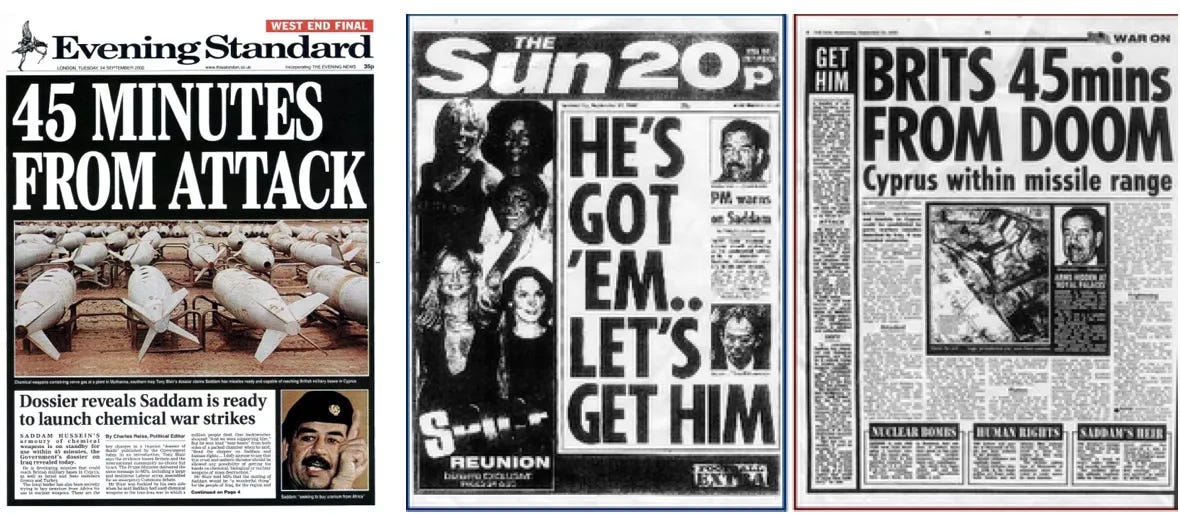
This claim was repeated in a radio address by George W. Bush that month. In January the next year, as the invasion of Iraq rapidly loomed, the President declared in his State of the Union address, “the British government has learned that Saddam Hussein recently sought significant quantities of uranium from Africa.” That December, then-CIA chief George Tenet admitted this assertion was completely fallacious, and “these 16 words should never have been included in the text written for the President.”
The Zionist entity justified its unprovoked assault against Iran in June in large part on an intelligence dossier, which concluded the Islamic Republic had reached the “point of no return” in acquiring nukes. Its findings relied heavily on a May IAEA report that provided zero fresh information, but concluded Tehran supposedly maintained “undeclared nuclear material” until the early 2000s. While intended to trigger regime change, Tel Aviv’s broadside ended promptly in embarrassing failure, despite extensive foreign support, including US airstrikes.
Undeterred by the fiasco, Benjamin Netanyahu remains determined to crush the “Iranian axis”, while Trump has declared he would bomb Tehran “without a question” in response to indications the Islamic Republic has enriched uranium beyond agreed levels. We could be on the precipice of another war. As with the Iraq invasion, the perilous trail that brought us to this grave point could lead back to London. Yet again, MI6 may have taken the lead in concocting ‘intelligence’, justifying further US-Israeli aggression against the Islamic Republic.
https://libya360.wordpress.com/2025/09/ ... uke-fraud/
******
Iran Publishes Classified Files on Israel’s Nuclear Program, Citing U.S. Involvement
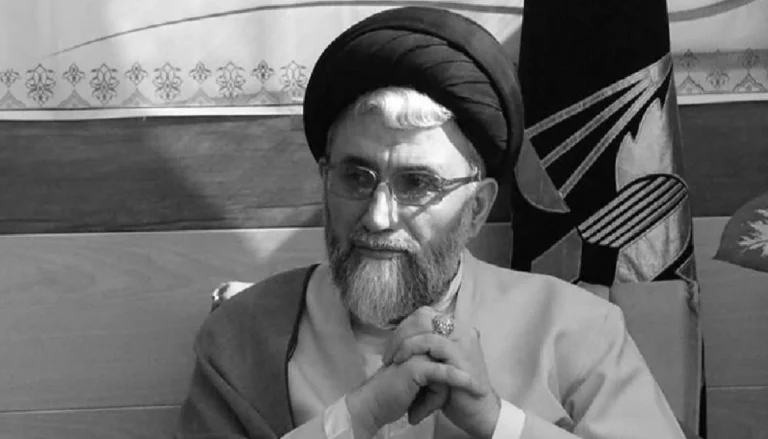
(FILE) Esmail Khatib, Iran’s Minister of Intelligence. Photo: National Council of Resistance of Iran.
September 25, 2025 Hour: 5:08 am
The Iranian government made public a series of classified documents related to Israel’s nuclear program, exposing strategic infrastructure, links with the United States, and projects connected to territorial occupation.
According to Iran’s Minister of Intelligence, Esmail Khatib, the information was gathered through the collaboration of individuals within Tel Aviv’s nuclear and security agencies, who allegedly transferred the files to Tehran over the course of several months as part of a secret operation.
“The volume of documents and the need to ensure their safe transfer required keeping the matter under strict confidentiality,” Khatib said.
The files reveal the active participation of the United States in Israel’s nuclear development, including the presence of American scientists, joint projects, and programs aimed at modernizing nuclear weaponry. Multilateral initiatives with European countries were also identified. In addition, the documents contain information about individuals involved in these projects.
According to Tehran, the disclosure of these materials represents a strategic defeat for the Zionist entity, which allegedly sought to conceal Iran’s penetration of its sensitive facilities. Access to detailed blueprints and internal systems highlights significant flaws in Israel’s security structure.
Khatib attributed this vulnerability to working conditions perceived as unfair by some Israeli employees, who allegedly collaborated with Iran in exchange for financial compensation.
https://www.telesurenglish.net/iran-pub ... volvement/
*****
Iran calls restrictions on its diplomats attending UNGA session in New York a new low of US animosity
The US has prevented Iranian diplomats from going anywhere beyond the perimeters of UN headquarters and buying anything from the wholesale club stores in New York city, calling the measure a part of its unilateral sanctions regime.
September 25, 2025 by Abdul Rahman
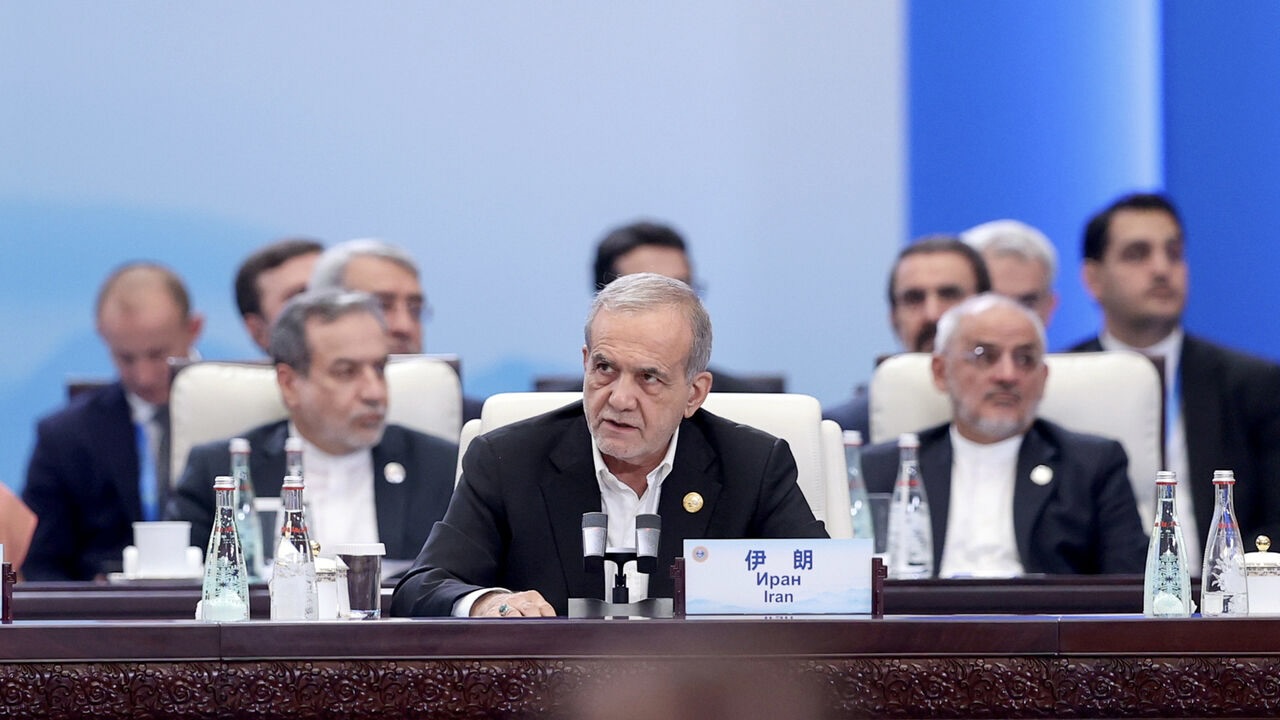
Iranian President Masoud Pezeshkian speaking at the SCO Summit. Photo: IRNA
On Wednesday, September 24, Iran accused the US of trying to sabotage its diplomatic mission attending the 80th annual session of the UN General Assembly in New York. It also called the restrictions imposed on the movement of its diplomats in the city “a new low in terms of showcasing the extent of animosity of US administration.”
“The US systematic harassment of Iranian diplomats has obstructed the Iranian delegates from attending several multilateral events that were held outside the so-called ‘permitted perimeters’ during this week only,” spokesperson of the Iranian Ministry of Foreign Affairs Esmaeil Baghaei said in a post on X.
The US Department of State had announced the restrictions on Iranian diplomats attending the UNGA session, claiming in a statement on Monday that it was part of its larger sanctions regime, the so-called “maximum pressure” campaign against the Iranian government.
The US has a long history of hostility toward the Iranian government. Throughout the history of the Islamic revolution, since 1979, the country has been under one or another kind of US sanctions.
Following his unilateral withdrawal from the multiparty nuclear deal in 2018, President Donald Trump had launched a new set of unilateral punitive measures against Iran, calling it a “maximum pressure campaign” apparently to force Iran to abandon its civilian nuclear program and missile defense program.
The US has prevented Iranian diplomats from moving anywhere outside the UN headquarters’ district and areas necessary for transit, claiming the measure is an attempt to prevent Iranians from using the “UNGA as an excuse to travel freely in New York to promote its terrorist agenda.”
The restrictions on Iranian diplomats at the UNGA included, among other things, them buying anything from the wholesale club stores and luxury goods in the city.
“We will not allow the Iranian regime to allow its clerical elites to have a shopping spree in New York while the Iranian people endure poverty, crumbling infrastructure, and dire shortages of water and electricity,” the statement from the state department reads.
A violation of Headquarters Agreement
Diplomats from over 150 countries are in New York this week to attend the 80th session of the UN General Assembly. Iran is the only full member country of the UN facing such restrictions from the US.
Iran accused that “applying such cheap restrictions on our diplomats’ movement” is a blatant violation of US obligations under the Headquarters Agreement.
Article 11 and 12 of the UN Headquarters Agreement, signed in 1947, says that irrespective of the state of the relationship between the US and a particular member state, the US government will not impose “any impediments to transit to and from the headquarters district” to diplomats and others invited by the UN.
The US has also denied visas to the Palestinian delegation and civil society groups, preventing them from attending the session despite it holding the status of an observer.
Acknowledging the significance of the UNGA session for Iran, President Masoud Pezeshkian claimed that it provides “an exceptional and unique opportunity to present the positions and views” of his country.
Noting the multilateral mandate of the UN, Pezeshkian however, accused certain world powers of pursuing unilateralist policies. He claimed that powerful countries across the world are using their influence and resources to oppress and destroy others, defeating the purpose of the UN.
“In the view of those countries, convergence means achieving their goals at the expense of everyone else’s lives. True convergence, however, means that all people, regardless of ethnicity, race, or beliefs, have the right to life and must respect the rights of others,” Pezeshkian said
https://peoplesdispatch.org/2025/09/25/ ... animosity/


